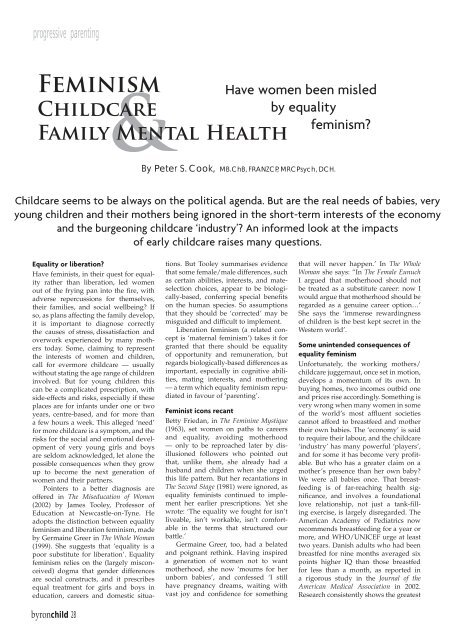byronchild - logo
byronchild - logo
byronchild - logo
Create successful ePaper yourself
Turn your PDF publications into a flip-book with our unique Google optimized e-Paper software.
progressive parenting<br />
Feminism<br />
Childcare<br />
Family Mental Health<br />
Equality or liberation?<br />
Have feminists, in their quest for equality<br />
rather than liberation, led women<br />
out of the frying pan into the fire, with<br />
adverse repercussions for themselves,<br />
their families, and social wellbeing? If<br />
so, as plans affecting the family develop,<br />
it is important to diagnose correctly<br />
the causes of stress, dissatisfaction and<br />
overwork experienced by many mothers<br />
today. Some, claiming to represent<br />
the interests of women and children,<br />
call for evermore childcare — usually<br />
without stating the age range of children<br />
involved. But for young children this<br />
can be a complicated prescription, with<br />
side-effects and risks, especially if these<br />
places are for infants under one or two<br />
years, centre-based, and for more than<br />
a few hours a week. This alleged ‘need’<br />
for more childcare is a symptom, and the<br />
risks for the social and emotional development<br />
of very young girls and boys<br />
are seldom acknowledged, let alone the<br />
possible consequences when they grow<br />
up to become the next generation of<br />
women and their partners.<br />
Pointers to a better diagnosis are<br />
offered in The Miseducation of Women<br />
(2002) by James Tooley, Professor of<br />
Education at Newcastle-on-Tyne. He<br />
adopts the distinction between equality<br />
feminism and liberation feminism, made<br />
by Germaine Greer in The Whole Woman<br />
(1999). She suggests that ‘equality is a<br />
poor substitute for liberation’. Equality<br />
feminism relies on the (largely misconceived)<br />
dogma that gender differences<br />
are social constructs, and it prescribes<br />
equal treatment for girls and boys in<br />
education, careers and domestic situa-<br />
<strong>byronchild</strong> 28<br />
Have women been misled<br />
by equality<br />
&By<br />
Peter S. Cook, MB.ChB, FRANZCP, MRCPsych, DCH.<br />
tions. But Tooley summarises evidence<br />
that some female/male differences, such<br />
as certain abilities, interests, and mateselection<br />
choices, appear to be biologically-based,<br />
conferring special benefits<br />
on the human species. So assumptions<br />
that they should be ‘corrected’ may be<br />
misguided and difficult to implement.<br />
Liberation feminism (a related concept<br />
is ‘maternal feminism’) takes it for<br />
granted that there should be equality<br />
of opportunity and remuneration, but<br />
regards biologically-based differences as<br />
important, especially in cognitive abilities,<br />
mating interests, and mothering<br />
— a term which equality feminism repudiated<br />
in favour of ‘parenting’.<br />
Feminist icons recant<br />
Betty Friedan, in The Feminine Mystique<br />
(1963), set women on paths to careers<br />
and equality, avoiding motherhood<br />
— only to be reproached later by disillusioned<br />
followers who pointed out<br />
that, unlike them, she already had a<br />
husband and children when she urged<br />
this life pattern. But her recantations in<br />
The Second Stage (1981) were ignored, as<br />
equality feminists continued to implement<br />
her earlier prescriptions. Yet she<br />
wrote: ‘The equality we fought for isn’t<br />
liveable, isn’t workable, isn’t comfortable<br />
in the terms that structured our<br />
battle.’<br />
Germaine Greer, too, had a belated<br />
and poignant rethink. Having inspired<br />
a generation of women not to want<br />
motherhood, she now ‘mourns for her<br />
unborn babies’, and confessed ‘I still<br />
have pregnancy dreams, waiting with<br />
vast joy and confidence for something<br />
feminism?<br />
Childcare seems to be always on the political agenda. But are the real needs of babies, very<br />
young children and their mothers being ignored in the short-term interests of the economy<br />
and the burgeoning childcare ‘industry’? An informed look at the impacts<br />
of early childcare raises many questions.<br />
that will never happen.’ In The Whole<br />
Woman she says: “In The Female Eunuch<br />
I argued that motherhood should not<br />
be treated as a substitute career: now I<br />
would argue that motherhood should be<br />
regarded as a genuine career option…’<br />
She says the ‘immense rewardingness<br />
of children is the best kept secret in the<br />
Western world’.<br />
Some unintended consequences of<br />
equality feminism<br />
Unfortunately, the working mothers/<br />
childcare juggernaut, once set in motion,<br />
develops a momentum of its own. In<br />
buying homes, two incomes outbid one<br />
and prices rise accordingly. Something is<br />
very wrong when many women in some<br />
of the world’s most affluent societies<br />
cannot afford to breastfeed and mother<br />
their own babies. The ‘economy’ is said<br />
to require their labour, and the childcare<br />
‘industry’ has many powerful ‘players’,<br />
and for some it has become very profitable.<br />
But who has a greater claim on a<br />
mother’s presence than her own baby?<br />
We were all babies once. That breastfeeding<br />
is of far-reaching health significance,<br />
and involves a foundational<br />
love relationship, not just a tank-filling<br />
exercise, is largely disregarded. The<br />
American Academy of Pediatrics now<br />
recommends breastfeeding for a year or<br />
more, and WHO/UNICEF urge at least<br />
two years. Danish adults who had been<br />
breastfed for nine months averaged six<br />
points higher IQ than those breastfed<br />
for less than a month, as reported in<br />
a rigorous study in the Journal of the<br />
American Medical Association in 2002.<br />
Research consistently shows the greatest


